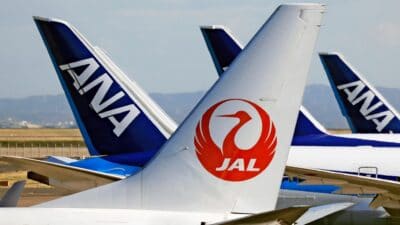OH YES! Indeed, the US is faring well in the Olympics. Just as the so-called Dream Team of the States opened its campaign for Olympic basketball redemption yesterday, Sunday with a 101-70 topping host China, it’s clear the US beats China hands-down on the court at least. “This wasn’t a game, this was a spectacle,” said sports buffs. And the fans, including President Bush, got what they came to see. Even China’s own Yao Ming, the All-Star center for the Houston Rockets, started the showcase drilling a three-pointer from the top of the key for the first score of the game.
Despite criticisms on his attendance of the Beijing event, Bush went ahead to cheer the fast-breakers. NBA players are wildly popular in China, where the league estimates 300 million people play basketball. The Americans, still known as the Dream Team, enjoyed a huge backing there.
Meanwhile, critics in the US gave the event itself some pretty low scores.
Sportswriter Dave Zirin, whose latest book is Welcome to the Terrordome: The Pain, Politics and Promise of Sports said in his piece China’s Olympic Trials: “This is the Olympics the West wanted: games where the grandest prize is not a gold medal but a glittering entree to China’s seemingly endless army of potential consumers.
Zirin added, “This is the reason that George W. Bush attends the opening ceremonies, the first U.S. President to do so on foreign soil, and that in March, mere days before the crackdown in Tibet, Condoleezza Rice, laughably, took China off the State Department’s list of nations that abuse human rights.”
Stop blasting China! Robert Lipsyte, correspondent for Tomdispatch.com and author of several books on sports – most recently Yellow Flag, a novel about stock car racing – thinks of giving China a ‘break’ for once.
He said, “The focus has unfairly been upon China rather than the true Evil Empire, the Olympic Nation-State which from the beginning (the all-male, naked Greek games) has been political and commercial, and since the 1896 Revival has traded in on the worst kind of nationalism, from fascism to Communism to Global corporatism, to keep its monopoly alive. But because it is a great festival of youth and beauty, I am going to watch every minute as a soft-porn show of great bodies at peak performance.”
As for increased arrivals, who said the Olympics will dramatically bump up tourist numbers? Not much of a chance.
A report released by the European Tour Operators Association (ETOA) two years ago claims countries who host the Olympic Games suffer from a drop in tourism growth in the years surrounding the event. There is no long-term boost to tourism, as has been widely asserted. In the case of Australia, a trend of over 10% growth in visitor arrivals turned into a decline two years before the Sydney Olympics. The stagnation persisted for more than two years after. Australia’s growth lost ground significantly straight after the Olympics.
A similar ‘Olympic Effect’ was also apparent for five other previous Olympics – in Sydney 2000, Atlanta 1996, Barcelona 1992 and Seoul 1988, according to Deloitte. Athens’ pattern appeared to be the same. In 2002, two years before the Olympics, arrivals in Greece were 8.2% up on the previous year but in 2003, numbers fell by 1.5%. This decline continued until the first part of 2004. One month before the start of the Games, visitor arrivals were 12% down.
Further the Olympic committee exaggerates numbers out of proportion. IOC President, Jacques Rogge said, in an effort to impress sponsors and media buyers, that the total cumulative world television audience – with viewers counted each time they watched – was around 40 billion for the Athens Olympics. Such numbers do not match reality. There are roughly 6.5 billion people on the planet. Of these, 1.6 billion have no access to electricity and a further 400 million are less than 5 years old. To achieve a cumulative audience of 40 billion involves nearly 3 billion people (or 60% of the available world) watching every single day of the games, further to the ETOA.
Tom Jenkins, executive director, ETOA said: “These findings may seem surprising because during the Games the city’s hotels are full. But this situation is short-lived. Olympic visitors tend not to be big consumers of sightseeing excursions; neither are they committed visitors to museums, historic monuments and other classic tourist attractions.”
He added, “The presence of the Olympics deters regular tourists: they perceive that the city will be full, disrupted, congested and over-priced. A reduction in the numbers of regular tourists halts the conveyor belt of satisfied customers bringing more visitors. ‘The word of mouth’ falls silent. In theory this should be replaced by an eager television audience. In practice, it is not.”
Jennifer Wedekind, associate editor, Multinational Monitor and co-author of the just-released report The Commercial Games said: “The Olympic rush to sell sponsorships to the highest bidders led to partnerships with companies whose products or methods of doing business betray Olympic ideals: junk food hawkers, beer and liquor peddlers, and equipment makers reliant on sweatshop contractors, among others.”
Indeed China’s oldest most popular beer Tsingtao scooped official sponsorship of the 2008 do. Confident as the king of beers in Asia, the brewery snapped the deal thinking … “The Beijing Olympics provides a rare chance for Chinese brands to gain global appreciation and build the image of ‘made in China’,” said Jin Zhi Guo, chairman and president of Tsingtao Brewery Co Ltd which launched its Olympics branding strategy the moment it became a sponsor of the Games.
Tsingtao Beer made a pledge to supply high-quality products for the Games, publicizing its home city and namesake Qingdao and preparing to pass along the Olympics spirit after the world’s biggest sporting event is over, said Jin adding, “We incorporate the spirit of the Olympics into our marketing strategy for Tsingtao Beer. We can provide better service to the Olympics than any other international brand.”
Tsingtao Brewery does not only cash in on its history of about a hundred years. It has also promised to take advantage of China’s drinking culture and heritage through tourism promotion. Mr. Jin said over 300,000 people coming from abroad and from within China tour the brewery. “I assume the brand will reconfirm our support for tourism,” he said.
Tsingtao is one perfect example on Wedekind’s target list. She said, “Though it’s true that any Olympic before has gotten more extreme with the amount of marketing and commercialization around the event, obviously it’s impossible not to have any corporate sponsorship, it should not be accepted as it is. The Olympic committee should be more discriminate in the partners they select. They should not accept sponsorships from any junk food manufacturers, alcoholic beverages and companies linked to blatant human rights abuses who use multiple sweatshops on their supply line.”
On tourism, hopefully China opens up even more. Wedekind argued, “As people are saying it’s great, that China is opening up to the rest of the world with this as their coming out party, the level of commercialism and corporatism around the Olympics undermine what the Olympics should be all about.”






















